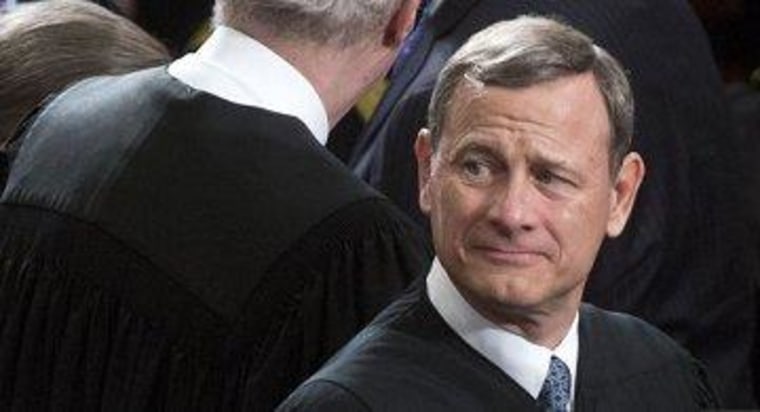There's quite a bit to digest in the transcript (pdf) of today's Supreme Court oral arguments on the Defense of Marriage Act, but one of the angles that jumped out at me was the discussion of the intent in the law when it was approved in 1996.
Justice Elena Kagan, for example, noted that Congress passed a law targeting a specific group. Hoping to knock down the right's argument that DOMA was about brining uniformity to national marriage laws, Kagan asked, "Do we really think that Congress was doing this for uniformity reasons, or do we think that Congress's judgment was infected by dislike, by fear, by animus" of LGBT Americans?
I'd hoped this was obvious, but Chief Justice John Roberts seemed quite troubled by the very idea that the Defense of Marriage Act had anything to do with anti-gay bigotry. He asked at one point:
"So that was the view of the 84 senators who voted in favor of it and the president who signed it? They were motivated by animus?"
Later, questioning another attorney, Roberts said it again.
"So 84 senators - it's the same question I asked before -- 84 senators based their vote on moral disapproval of gay people?"
I don't understand what Justice Roberts doesn't understand. Does he not remember 1996? Does he not remember the election-year culture-war debate?
There were, at the time, two groups of people who supported DOMA: (1) those who voted for it because they don't like gay people; and (2) those who voted for it because they hoped to get re-elected by Americans who don't like gay people.
Some were motivated by bigotry and some were driven by cravenness, but Roberts need not be deliberately obtuse about how and why the Defense of Marriage became federal law.
Kagan herself tried to make this clear, reading from the House Report on DOMA: "Congress decided to reflect an honor of collective moral judgment and to express moral disapproval of homosexuality."
In one of my favorite lines in the transcript, Paul Clement, the attorney hired by House Republicans to defend DOMA, responded to Kagan:
"Does the House Report say that? Of course, the House Report says that. And if that's enough to invalidate the statute, then you should invalidate the statute. "
"Of course, the House Report says that."
Does anyone really see the need to pretend DOMA wasn't about anti-gay discrimination?
I was struck by some of the examples included in one of the briefs (pdf) filed with the Supreme Court against DOMA, which explained, "The only asserted interest actually advanced by DOMA's unprecedented expansion of federal power is expressing moral disapproval of homosexuality and same-sex relationships."
It included some interesting quotes from the lawmakers who championed DOMA at the time about why they backed the proposal:
Individual congressional proponents of DOMA expressed their disapproval of homosexuality and the gay-rights movement in starker terms. For example, then-Representative (now Senator) Tom Coburn asserted that his constituents believe "homosexuality is immoral, that it is based on perversion, that it is based on lust." 142 Cong. Rec. H7444 (daily ed. July 11, 1996). Representative David Funderburk asserted: "Homosexuality has been discouraged in all cultures because it is inherently wrong and harmful to individuals, families, and societies. The only reason it has been able to gain such prominence in America today is the near blackout on information about homosexual behavior itself." 142 Cong. Rec. H7487 (daily ed. July 12, 1996).Representative Lamar Smith opined that "[s]ame-sex 'marriages' . . . legitimize unnatural and immoral behavior." Id. at H7494. Representative Henry Hyde, while disclaiming mean-spiritedness or bigotry, asserted that "[t]he homosexual movement has been very successful in intimidating the psychiatric profession." Id. at H7501.
There's not much in the way of ambiguity here, whether John Roberts cares to admit it or not.
